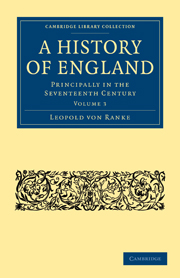Book contents
- Frontmatter
- Contents
- BOOK XI THE COMMONWEALTH IN ENGLAND, 1649—1653
- CHAP. I Republican ideas and institutions in England. The Levellers
- CHAP. II Rinuccini and Cromwell in Ireland
- CHAP. III Charles II and Cromwell in Scotland
- CHAP. IV Growth of the power of the Commonwealth by land and sea
- CHAP. V Dissolution of the Long Parliament
- CHAP. VI The Little Parliament
- BOOK XII THE PROTECTORATE OF OLIVER CROMWELL, 1653–1658
- BOOK XIII FALL OF THE PROTECTORATE AND THE COMMONWEALTH. RESTORATION OF THE MONARCHY, 1658—1660
- BOOK XIV THE FIRST FIVE YEARS UNDER CHARLES II. THE RESTORATION OF THE ANGLICAN CHURCH
- BOOK XV THE DUTCH WARS OF CHARLES II. ESTABLISHMENT OF THE PROTESTANT AND PARLIAMENTARY CHARACTER OF THE CONSTITUTION 1664—1674
CHAP. I - Republican ideas and institutions in England. The Levellers
Published online by Cambridge University Press: 07 June 2011
- Frontmatter
- Contents
- BOOK XI THE COMMONWEALTH IN ENGLAND, 1649—1653
- CHAP. I Republican ideas and institutions in England. The Levellers
- CHAP. II Rinuccini and Cromwell in Ireland
- CHAP. III Charles II and Cromwell in Scotland
- CHAP. IV Growth of the power of the Commonwealth by land and sea
- CHAP. V Dissolution of the Long Parliament
- CHAP. VI The Little Parliament
- BOOK XII THE PROTECTORATE OF OLIVER CROMWELL, 1653–1658
- BOOK XIII FALL OF THE PROTECTORATE AND THE COMMONWEALTH. RESTORATION OF THE MONARCHY, 1658—1660
- BOOK XIV THE FIRST FIVE YEARS UNDER CHARLES II. THE RESTORATION OF THE ANGLICAN CHURCH
- BOOK XV THE DUTCH WARS OF CHARLES II. ESTABLISHMENT OF THE PROTESTANT AND PARLIAMENTARY CHARACTER OF THE CONSTITUTION 1664—1674
Summary
It was not in any old parliamentary pretensions, which had gradually risen higher and higher, that the English Republic had its origin, but in a different group of ideas, no less decidedly opposed to the Parliament, such as it had hitherto been, than to the monarchy itself.
In order to understand both the events of the time and the consequences which followed, it is indispensable to realise clearly this opposition. For those motives which give the impulse at the foundation of a new state of things incessantly react upon it.
At the moment when a union appeared possible between the King, the Parliament, and some of the leading officers, on the basis of the old constitution (October 1647), the Agitators in the army conceived the plan of actually carrying out the idea of the sovereignty of the people, so often invoked before, and of building up anew the constitution of the country on that basis. This plan is undisguisedly and expressly stated in the petition which was presented at the time to the council of officers, in the name of five regiments of cavalry. ‘Forasmuch,’ so runs the petition, ‘as all power is originally and in reality vested in the collective people of this nation, the free choice of their representatives and their consent is the sole basis of a lawful government, while the end of government is the common weal.’
- Type
- Chapter
- Information
- A History of EnglandPrincipally in the Seventeenth Century, pp. 3 - 21Publisher: Cambridge University PressPrint publication year: 2010First published in: 1875

